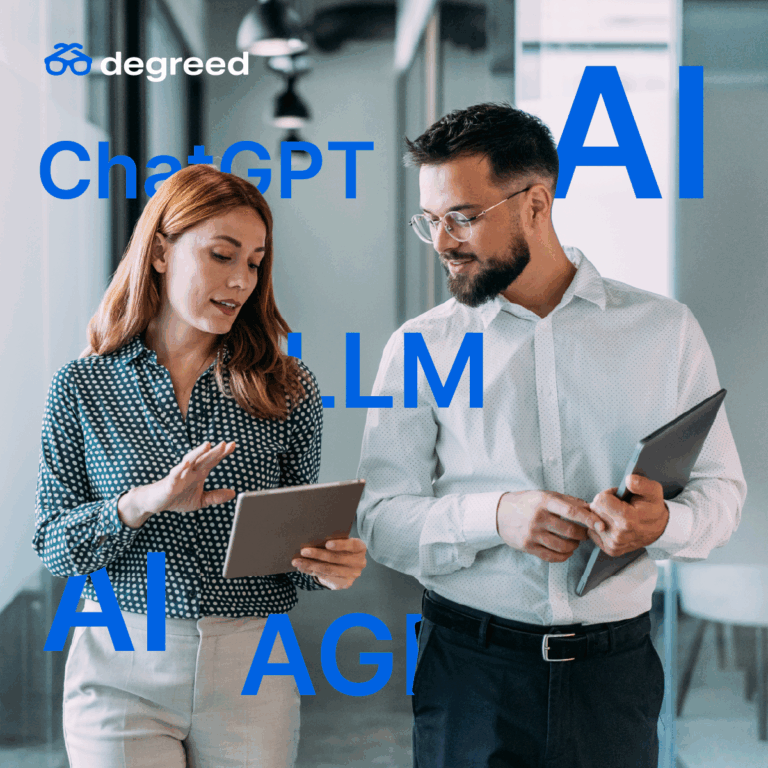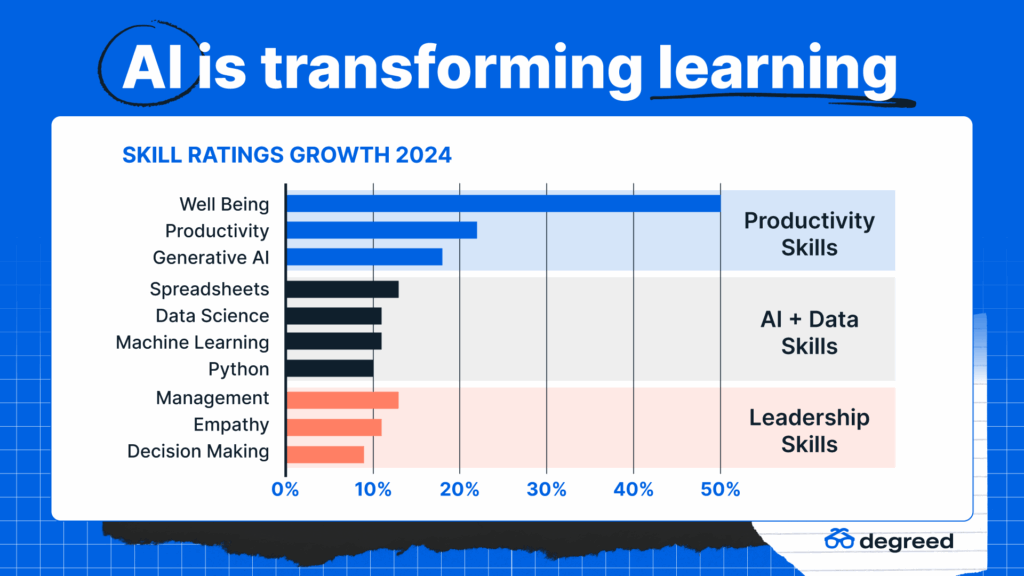
Workplace AI Is Changing Learning in Unexpected Ways
When ChatGPT hit the market, business leaders knew change was coming. Fast forward to today, and 92 percent of companies plan to increase their AI investments over the next three years. AI is changing learning big-time—both in what employees need to learn and how they learn it.
In the workplace, AI isn’t only speeding up learning delivery or content creation. It’s helping leaders pinpoint critical skills, personalize learning at scale, and measure and validate L&D to supercharge skill building across the enterprise. In doing so, it’s changing the very fabric of workplace learning: how learning happens, why employees engage with it, and how organizations must design for it.
Shifting Goals: From Learning Skills to Learning to Learn
Have you seen the headlines about how using AI is rotting our brains? It’s a concern in both education and the workforce. Our own Nicole Helmer, VP of Product Management for Skills and AI at Degreed, sees the problem too.
“As AI automates more complex decision-making, employees may be outsourcing their problem-solving abilities to algorithms, weakening their capacity for deep reasoning,” Helmer said. “Over time, this could lead to a shallow work economy—where employees are hyper-efficient but intellectually passive, executing tasks without engaging in true problem-solving. Plus, if critical thinking is outsourced to AI, it becomes a commodity—available to anyone with access to the same tools.”
For HR and IT leaders, mitigating this risk is critical—not just to preserve learning quality, but to safeguard workforce productivity and innovation capacity.
One clear example of how AI in the workplace is reshaping skill expectations is in the field of coding, one of AI’s most useful skills to date.
Once considered a must-have future skill, coding itself is now on AI’s chopping block.
Some tech leaders, like Chamath Palihapitiya, a venture capitalist and former Facebook executive, are telling people to forget about learning to code altogether. “The engineer’s role will be supervisory, at best, within 18 months,” he tweeted. He told parents to steer their kids toward philosophy, psychology, history, physics, and English writing instead.
Other leaders are less pessimistic about the future of skills like code writing but still agree that workers will need other critical thinking skills to best leverage AI in the workplace and stay competitive in the job market. Armando Solar-Lezama, leader of the MIT Computer Assisted Programming Group, recently told the New York Times, “When you’re talking about more foundational skills, knowing how to reason about a piece of code, knowing how to track down a bug across a large system, those are things that the current models really don’t know how to do.”
While coding is a high-profile example, this shift applies broadly—across marketing, finance, operations, and more—as AI automates increasingly complex knowledge work.
Ali Bebo, CHRO at Pearson, put it this way at the Degreed 2025 LENS session Future-Proofing HR: The Impact of AI and Emerging Technology: “If you’re able to learn to learn, it’s a force multiplier… Skills acquisition can come much faster, so we’re really leaning into a kind of learning science.”
AI is changing what employees learn.
With AI barreling its way into workplaces, employees aren’t just growing their cognitive and human skills alongside AI and data skills. More than any other skill group, workers are leaning into building their productivity skills.
Degreed data from 2024 shows learning generative AI skills, which employees are leveraging to complete work more efficiently, grew at nearly 20%. General productivity skills are even more popular. But what really blew us away was a 50% growth in wellbeing skills.

At first, we weren’t sure what to make of this trend. But when constant cognitive load from learning is all in a day’s work, workers are going to need to stay on top of their mental health or risk stagnated learning.
“There’s going to be a convergence of productivity, wellness, and learning,” said Helmer. “AI is going to be able to integrate learning into the daily work, balancing the cognitive load and your particular situation. Imagine an AI system that can recognize when you’re getting mentally fatigued and suggests a short break or changes the dynamic of the content, or schedules things in your downtime instead of this one-size-fits-all course. The future of learning won’t be a task you have to schedule. It’s embedded into the flow of your life in ways that are going to enhance your performance and your mental wellbeing.”
Alongside wellbeing and productivity skills, workers are also boosting demand for other, more human, skills. When employees can simply ask AI for knowledge or to complete a task, learning becomes less about gaining knowledge and more about critical thinking and decision-making.
AI and data skills—like using spreadsheets, data science, machine learning, and Python—rose at least 10%. But we also saw nearly as much growth in leadership skills—like management, empathy, and decision making needed for innovation and agility.
AI in the workplace may be taking over some of our cognitive load, but it can’t replace higher-level cognitive skills or our more human-centric skills.
As organizations adapt, strengthening human skills is becoming essential not just for employee growth, but for leadership pipeline resilience and long-term business agility.
AI is changing how employees learn.
AI can help you pinpoint critical skill needs and make learning more efficient, but in-demand skills will always be a moving target. Rapidly evolving AI technology means staying ahead of the skills gap will require constant learning. Employees need to build confidence, not just in their ability to learn AI, but in their ability to keep learning in general.
“Employees don’t just need knowledge,” Helmer said. “They need intentional strategies and tools to manage their cognitive and emotional energy in a high-speed, AI-powered workplace. Learning plays a crucial role in this balance, equipping employees with the skills to navigate complexity while fostering cognitive resilience. By ensuring learning is a regular practice, like physical exercise, organizations ensure employees don’t just execute tasks efficiently but also develop the deep-thinking, adaptability, and problem-solving skills necessary to thrive in an AI-driven world.”
Supporting cognitive resilience at scale will increasingly require integrated learning systems that adapt to employee needs dynamically, optimizing both performance and well-being. And the good news? The same technology that’s driving this workforce challenge can also be the solution.
Degreed is already making inroads. Automated nudges and AI coaches are already helping employees learn in the flow of work. Small lessons at the time of need and real-world projects help keep employees learning without overwhelming them or pulling them away from productive work.
As AI is changing learning, L&D gets a new focus.
Today, it’s not just about focusing on new skills. Tinkering at the edges won’t cut it. Meeting the future will demand tearing down old learning models—and rebuilding for a workforce shaped by AI, resilience, and relentless change.
The good news is that businesses can leverage AI to solve the very challenges it’s creating. “AI isn’t just changing learning,” Helmer said. “It’s making it more personal, more immersive, and more strategic. And beyond that, it’s going to blur these lines between productivity and wellness.”
Unser heißer Draht zu Ihnen  .
.
Exklusive Einblicke, Infos zu bevorstehenden Veranstaltungen, Updates zu Degreed-Lösungen – das alles erwartet Sie in unserem monatlichen Newsletter.
Ihre Privatsphäre hat für uns oberste Priorität. Es ist Ihnen jederzeit möglich, Ihre Einstellungen für den Erhalt von E-Mails zu ändern oder Ihr Abonnement abzubestellen. Die von Ihnen bereitgestellten Informationen werden nur verwendet, um Ihnen Mitteilungen entsprechend Ihren Präferenzen zuzusenden. Weitere Einzelheiten hierzu finden Sie in der Degreed-Datenschutzerklärung.